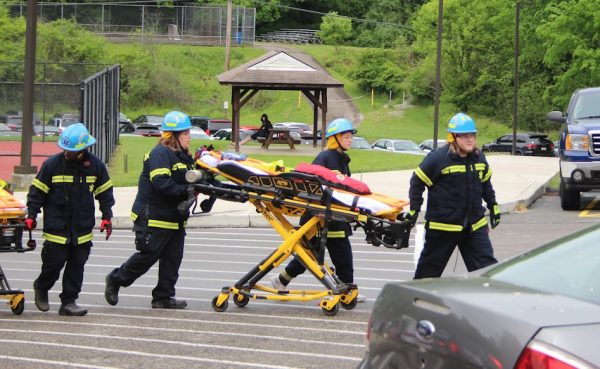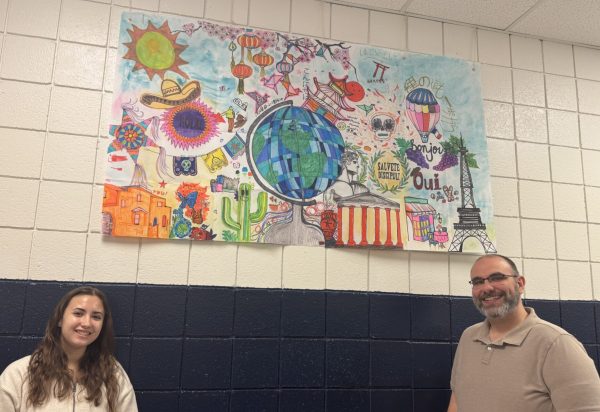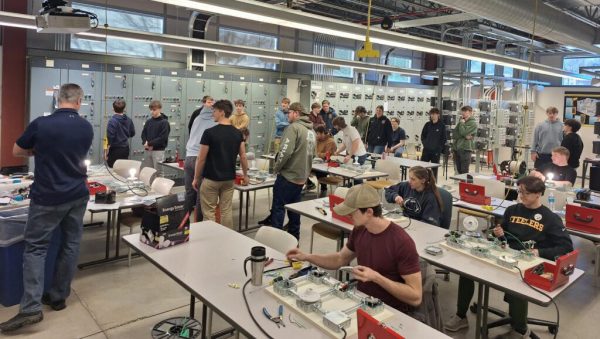Teachers adjust to online teaching but long for the classroom
People of all ages have been heavily impacted by the coronavirus pandemic. While it’s very obvious that essential workers like doctors and grocery store employees have been working endlessly, so have the teachers who we used to see every day. Although it may not seem like a drastic change, most are taking on the very unfamiliar role of teaching their students online.
We are incredibly lucky to have access to the many technological devices that made the transfer from in class instruction to online instruction possible. However, while the teachers throughout our district are longing to be back in the classroom, they are also learning how to effectively teach their students from a distance.
Most teachers envision their job as waking up every morning, heading to school and instructing their students face to face in a classroom. This remote learning environment prevents them from having access to their main motivators: their students. Believe it or not, the lack of motivation is an issue across the board for both students and teachers.
“I need the energy of my students to really come alive as a teacher. I miss their perspectives, curiosity, and sarcasm,” AP Biology teacher Mrs. Emily Mohr said.
Whether introverted or extroverted, every teacher can attest to the fact that in-class instruction is incomparable to remote learning. Interacting with their students and colleagues each day is what makes their job rewarding. Since every day is different, many teachers look forward to going to school to see what the day will hold.
“The best thing about teaching in-person is that each day and class is different. I feed off of the energy of students. I miss sharing examples in my classes and seeing the reactions of my students, whether it be laughing, smiling, cringing, or shaking their heads. Nothing can replace those types of moments,” Economics and Psychology teacher Mr. William Mitchell said.
Teachers have faced many additional challenges along with missing the energy from their students. Because some classes revolve primarily around discussions and lectures, like many English and history classes, teachers have been required to find new ways to talk about information with their students. Since they were advised not to use live video-conferencing, many instructors have found creative ways to get their students involved via Google Classroom or other online resources.
“Instead of lectures, I wrote analysis questions. I was trying to give my students a lens through which they could look at the novel we are reading themselves, rather than looking at it through my eyes alone. This is easy enough for me to do in a classroom discussion, but writing questions for students to read, consider, and respond to all alone was a new challenge,” English teacher Ms. Hilary Domencic said.
While this new method of teaching isn’t preferred, the teachers have learned to adapt in order to keep their students learning and growing each day. Surprisingly, there is a lot of pressure on our instructors during this crisis. With the lack of feedback and in-person interaction with their students, some teachers are worried about letting their students down and are trying their hardest to ensure that lessons are still being understood properly.
“This has been a challenge for all of us. We are trying to make the best of a bad situation. I’m trying to teach Shakespeare which in my class normally involves a lot of in-class reading, projects and small group work to help with interpretation and understanding. I’ve come up with alternative ways to present the material, but I know it’s not the same as it would be in class and I know the kids aren’t getting the same experience as they normally would. I feel bad about that,” English teacher Mr. Eric Schott said.
Despite the fact that teachers are unable to communicate with their students verbally, seeing them participate and complete their assignments in a timely fashion helps them feel a sense of satisfaction. For the teachers, their students’ ability to learn the material and complete the work gives some satisfaction.
Although this change has not been easy for anyone, there are many things that it has taught us and those lessons are some we will never forget. People around the world will come out of this situation with an abundance of gratitude and a much more optimistic outlook on life.
For teachers, their lack of student interaction has made them eager to get back to school and cherish class time.
“That’s one reason this experience will make me a better teacher in the long run. I have a renewed sense of purpose and value of the classroom experience,” Domencic said.













Mrs. Townsend • Oct 28, 2020 at 1:13 pm
Ashley
Thank you for conveying a balanced perspective in your article.
Keep up the good journalism.
Mrs. Townsend